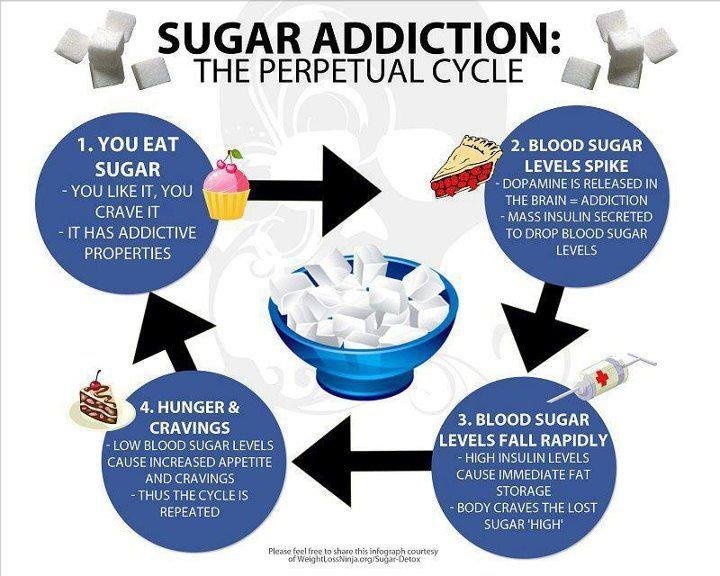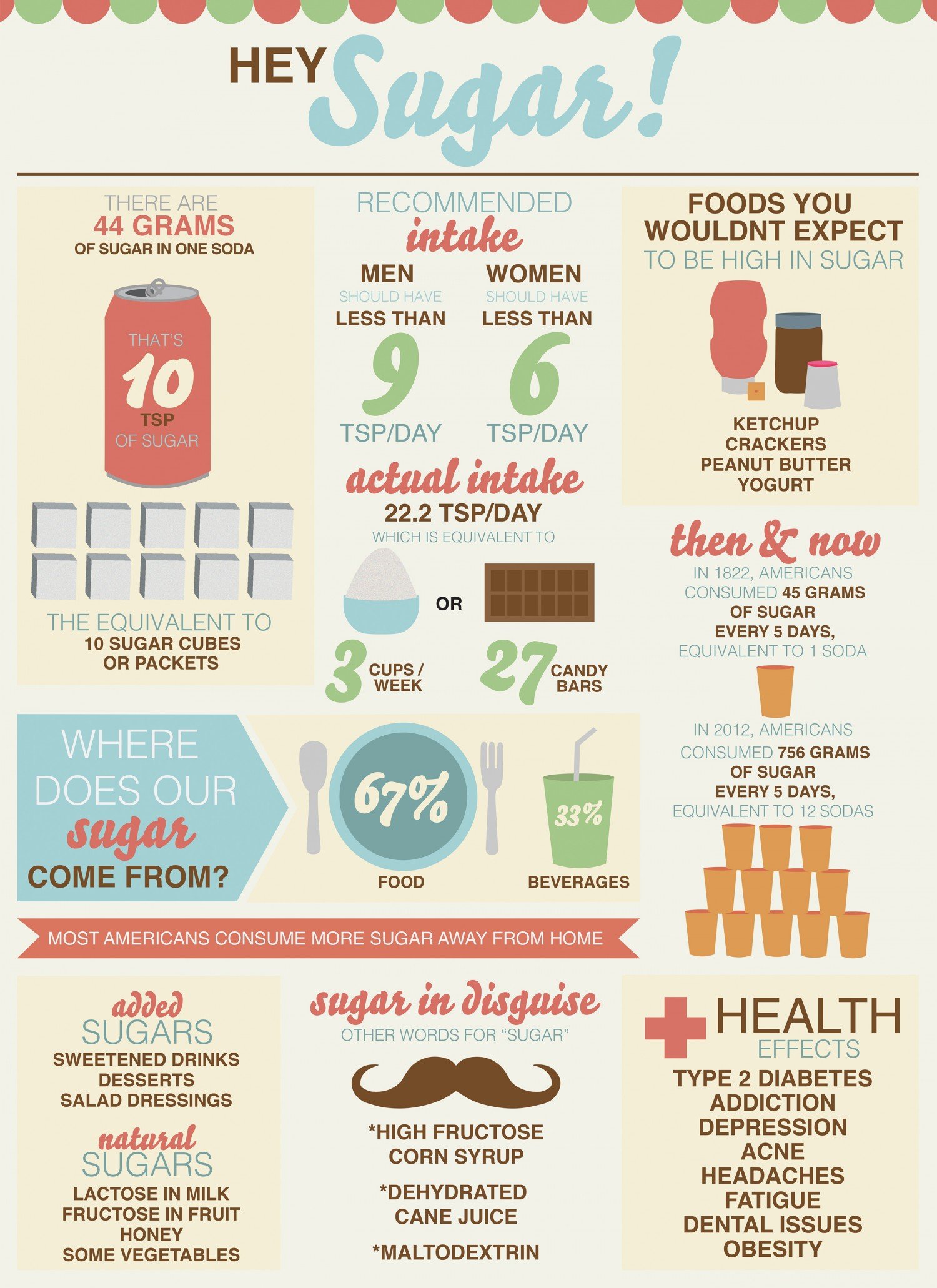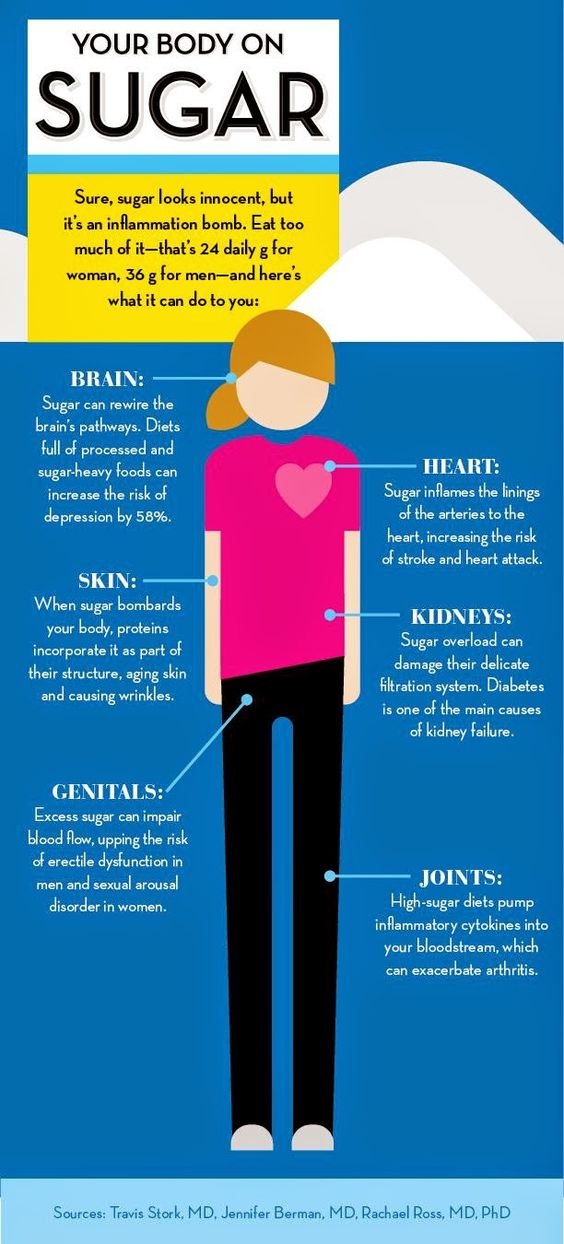
Sugar - it's sweet, delicious and wonderful!
We all know that sugar is linked to weight gain, but it actually has a lot of other interesting effects on our body and brain as well.
Did you know that sugar slows down your thinking, ages your skin and is addictive?
Sugar and the Brain
Whenever we eat something, our tastebuds are being activated and they send a signal to our cerebral cortex.
When we eat something sweet, our reward system is being activated as well though - this reward system initiates the release of Dopamine, the Happy Hormone, which makes us feel good and basically teaches us to repeat that behaviour.
While Dopamine is being released after a lot of actions like social behaviour or drugs, sugar is actually one of the very few foods that initiate this release.
An over-stimulationg of this reward system leads to food cravings, over eating, and also an increased tolerance to sugary foods.
In 2015, a study from the MIT actually conducted the circuit of sugar addiction - the LH-VTA Loop.
This is a loop between the lateral hypothalamus (LH, this part of your brain controls the feeling of hunger) and the Ventral Tegmental Area (VTA, which is the center of our brain's reward system).
Experiments with mice showed that the activation of this loop made mice overeat, and they would even walk over a platform with electric shocks only to get to the sugar, which is a clear symptom for addiction.

Sugar Addiction?
When we eat a nice, balanced meal, our dopamine levels temporarily spike - eating delicious and nutritious food makes us feel good.
But if we eat the same dish over and over again for a long period of time, our dopamine levels decrease more and more until there's no more spike.
Our brain wants us to always eat new foods because:
1. This is a way to keep us from eating food that has gone bad over time.
2. A more diverse diet also means that we get more different nutrients - and the chances are higher to get all the nutrients we need.
So far, so good - But now what if we eat sugar instead of balanced meal?
If we rarely eat sugar or only a little bit at a time, the effect is similar to the one explained above, where we eat a balanced meal
But if you consume sugar regularly or too much in one go, your dopamine levels never even out - they keep goig up!
Your reward system keeps being activated and encourages you to repeat the action.
This process is similar to other addictive substances like cocaine or nicotine - so yes, sugar is addictive, only in smaller amounts than traditional drugs.

Hidden sugar
The problem is that nowadays, sugar is not only contained in obvious things like candy - sugar is hidden almost everywhere, especially in processed foods but also things like ketchup, dried fruits, granola, flavored water...
It's also very hard for the consumer to identify sugar, because the labels use many different names like fructose, glucose, sucrose, maltose lactose, dextrose, and even starch and high fructose corn syrup.
So no wonder that many people are consuming too much sugar.
According to the WHO, an adult should only eat about 25g of sugar (6 teapsoons) daily.
To put this into perspective, one can of coke already contains 39g of sugar.

Other effects of sugar on the body
1.) It slows down your thinking process
In 2012, a study from UCLA showed that the learning and memory ability were decreased when people were constantly on a diet with a lot of sugar.
That's because eating sugar regularly creates a tolerance for Insuline - which normally improves and strengthens the connections between two Neurons.
So when we eat too much sugar too often, our insulin levels decrease and we process information slower.
2.) It makes our skin age
Collagen and Elastin are what keep our skin flexible and looking young because they help the cells repair themselves.
Over time, these chemicals decrease anyway - but sugar breaks them down even quicker.
This means that having a very sugary diet for a long time speeds up the aging process of your skin - and once the first wrinkles have appeared, you can't erase them.
3.) It has similar damage to stress
A recent study on rats showed that sugar is damaging the brain similarly to the way stress is damaging it:
The study tested different groups of rats. Some were exposed to stress in their childhood, and some weren't, but had access to a sugar solution.
The brains of rats that constantly drank sugar looked similar to rats that were stressed - but those didn't had any sugar!
Researchers concluded that both experiences (early life stress and consuming sugar) lowered the expression of a receptor that binds cortisol.
Cortisol is the boy's ain stress hormone - and this may decrease the ability to recover from a stressful situation.

Images: 1, 2, 3, 4, 5, Sources: 1, 2, 3, 4, 5
- Instagram -

© Sirwinchester
